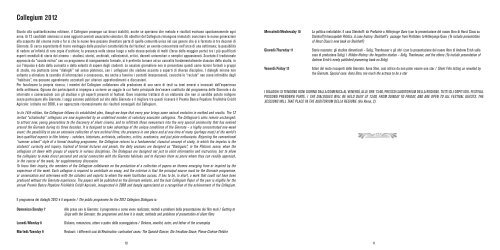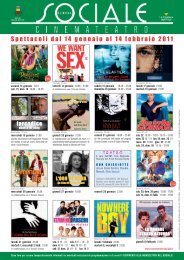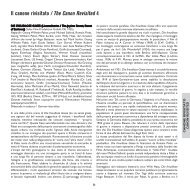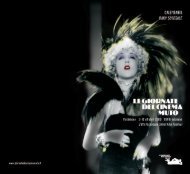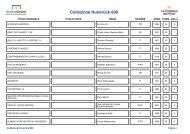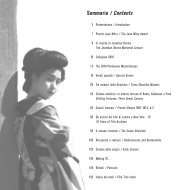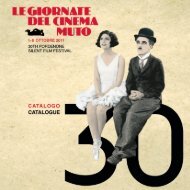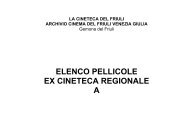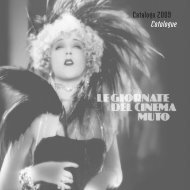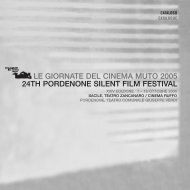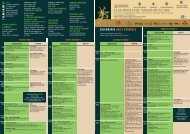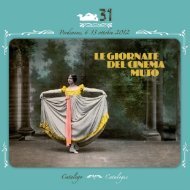Catalogo Giornate del Cinema Muto 2012 - La Cineteca del Friuli
Catalogo Giornate del Cinema Muto 2012 - La Cineteca del Friuli
Catalogo Giornate del Cinema Muto 2012 - La Cineteca del Friuli
You also want an ePaper? Increase the reach of your titles
YUMPU automatically turns print PDFs into web optimized ePapers that Google loves.
Collegium <strong>2012</strong><br />
Giunto alla quattordicesima edizione, il Collegium prosegue sui binari stabiliti, anche se speriamo che metodo e risultati evolvano spontaneamente ogni<br />
anno. Ai 12 candidati ammessi si sono aggiunti svariati associates volontari. Gli obiettivi <strong>del</strong> Collegium rimangono immutati: avvicinare le nuove generazioni<br />
alla scoperta <strong>del</strong> cinema muto e far sì che le nuove leve possano diventare parte di quella comunità unica nel suo genere che si è formata in tre decenni di<br />
<strong>Giornate</strong>. Si cerca soprattutto di trarre vantaggio dalle peculiari caratteristiche <strong>del</strong> festival: un evento concentrato nell’arco di una settimana; la possibilità<br />
di vedere un’infinità di rare copie d’archivio; la presenza nello stesso luogo e nello stesso periodo di molti (forse <strong>del</strong>la maggior parte) tra i più qualificati<br />
esperti mondiali di storia <strong>del</strong> cinema – studiosi, storici, archivisti, collezionisti, critici, docenti universitari e semplici appassionati. Scartato il tradizionale<br />
approccio da “scuola estiva” con un programma di insegnamento formale, si è preferito tornare ad un concetto fondamentalmente classico <strong>del</strong>lo studio, in<br />
cui l’impulso è dato dalla curiosità e dalla volontà di sapere degli studenti. Le sessioni giornaliere non si presentano quindi come lezioni formali o gruppi<br />
di studio, ma piuttosto come “dialoghi” nel senso platonico, con i collegians che siedono accanto a esperti di diverse discipline. I dialoghi mirano non<br />
soltanto a stimolare lo scambio di informazioni e conoscenze, ma anche a favorire i contatti interpersonali, cosicché le “reclute” non siano intimidite dagli<br />
“habitués”, ma possano agevolmente accostarli per ulteriori approfondimenti e discussioni.<br />
Per focalizzare la propria ricerca, i membri <strong>del</strong> Collegium collaborano alla produzione di una serie di testi su temi emersi o innescati dall’esperienza<br />
<strong>del</strong>la settimana. Ognuno dei partecipanti si impegna a scrivere un saggio la cui fonte principale dev’essere costituita dal programma <strong>del</strong>le <strong>Giornate</strong> o da<br />
interviste e conversazioni con gli studiosi e gli esperti presenti al festival. Deve insomma trattarsi di un elaborato che non si sarebbe potuto redigere<br />
senza partecipare alle <strong>Giornate</strong>. I saggi saranno pubblicati sul sito <strong>del</strong>le <strong>Giornate</strong> e il migliore tra questi riceverà il Premio Banca Popolare FriulAdria Crédit<br />
Agricole: istituito nel 2008, è un apprezzato riconoscimento dei risultati conseguiti dal Collegium.<br />
In its 14th edition, the Collegium follows its established plan, though we hope that every year brings some natural evolution in method and results. The 12<br />
invited “scholarship” collegians are now augmented by an undefined number of voluntary associate collegians. The Collegium’s aims remain unchanged:<br />
to attract new, young generations to the discovery of silent cinema, and to infiltrate these newcomers into the very special community that has evolved<br />
around the <strong>Giornate</strong> during its three decades. It is designed to take advantage of the unique conditions of the <strong>Giornate</strong> – a highly concentrated one-week<br />
event; the possibility to see an extensive collection of rare archival films; the presence in one place and at one time of many (perhaps most) of the world’s<br />
best-qualified experts in film history – scholars, historians, archivists, collectors, critics, academics, and just plain enthusiasts. Rejecting the conventional<br />
“summer school” style of a formal teaching programme, the Collegium returns to a fundamental, classical concept of study, in which the impetus is the<br />
students’ curiosity and inquiry. Instead of formal lectures and panels, the daily sessions are designed as “Dialogues”, in the Platonic sense, when the<br />
collegians sit down with groups of experts in various disciplines. The Dialogues are designed not just to elicit information and instruction, but to allow<br />
the collegians to make direct personal and social connection with the <strong>Giornate</strong> habitués and to discover them as peers whom they can readily approach,<br />
in the course of the week, for supplementary discussion.<br />
To focus their inquiry, the members of the Collegium collaborate on the production of a collection of papers on themes emerging from or inspired by the<br />
experience of the week. Each collegian is required to contribute an essay, and the criterion is that the principal source must be the <strong>Giornate</strong> programme,<br />
or conversation and interviews with the scholars and experts to whom the week facilitates access. It has to be, in short, a work that could not have been<br />
produced without the <strong>Giornate</strong> experience. The papers will be published on the <strong>Giornate</strong> website, and the best Collegium Paper of the year is eligible for the<br />
annual Premio Banca Popolare FriulAdria Crédit Agricole, inaugurated in 2008 and deeply appreciated as a recognition of the achievement of the Collegium.<br />
Il programma dei dialoghi <strong>2012</strong> è il seguente / The public programme for the <strong>2012</strong> Collegium Dialogues is:<br />
Domenica/Sunday 7 Alle prese con le <strong>Giornate</strong>: il programma e come viene realizzato; metodi e problemi <strong>del</strong>la presentazione dei fi lm muti / Getting to<br />
Grips with the <strong>Giornate</strong>: the programme and how it is made; methods and problems of presentation of silent fi lms<br />
Lunedì/Monday 8 Dickens, romanziere, attore e padre <strong>del</strong>la sceneggiatura / Dickens, novelist, actor, and father of the screenplay<br />
Martedì/Tuesday 9 Restauri: i differenti casi di/Restoration: contrasted cases: The Spanish Dancer; Die freudlose Gasse; Phono-Cinéma-Théâtre<br />
10<br />
Mercoledì/Wednesday 10 <strong>La</strong> politica ineluttabile. Il caso Steinhoff: da Prellstein a Hitlerjunge Quex (con la presentazione <strong>del</strong> nuovo libro di Horst Claus su<br />
Steinhoff)/Inescapable Politics. A case history: Steinhoff’s passage from Prellstein to Hitlerjunge Quex (To include presentation<br />
of Horst Claus’s new book on Steinhoff)<br />
Giovedì/Thursday 11 Storie nascoste: gli studios dimenticati – Selig, Thanhouser e gli altri (con la presentazione <strong>del</strong> nuovo libro di Andrew Erish sulla<br />
casa di produzione Selig) / Hidden History: the forgotten studios – Selig, Thanhouser, and the others (To include presentation of<br />
Andrew Erish’s newly published pioneering book on Selig)<br />
Venerdì/Friday 12 Attori <strong>del</strong> muto riscoperti dalle <strong>Giornate</strong>: Anna Sten, così attrice da non poter essere una star / Silent Film Acting as revealed by<br />
the <strong>Giornate</strong>. Special case: Anna Sten, too much the actress to be a star<br />
I DIALOGHI SI TENGONO OGNI GIORNO DALLA DOMENICA AL VENERDÌ, ALLE ORE 13:00, PRESSO L’AUDITORIUM DELLA REGIONE. TUTTI GLI OSPITI DEL FESTIVAL<br />
POSSONO PRENDERVI PARTE. / THE DIALOGUES WILL BE HELD DAILY AT 13:00, FROM SUNDAY TO FRIDAY, AND ARE OPEN TO ALL FESTIVAL GUESTS. THE<br />
SESSIONS WILL TAKE PLACE IN THE AUDITORIUM DELLA REGIONE (Via Roma, 2).<br />
11


